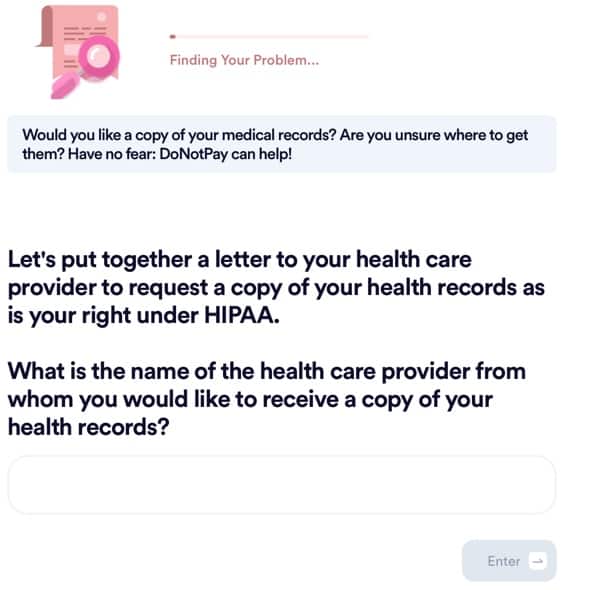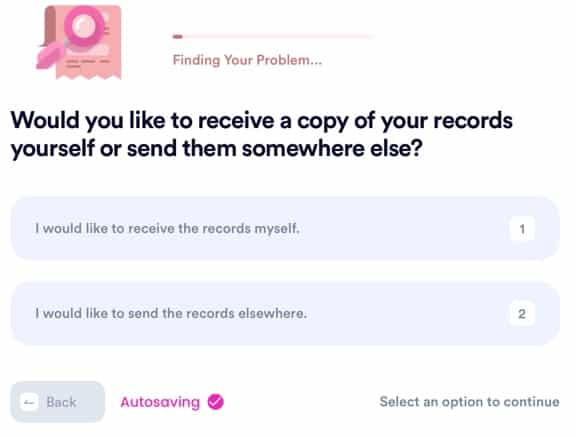Get Help Obtaining Medical Records of a Deceased Parent With DoNotPay
A parent's funeral is one of the most awful experiences most people can go through. To make matters worse, there are all sorts of complications to the situation beyond the funeral itself. For one, you might need to obtain medical records, which is traditionally an irritating process even if you're alive.
During these trying times, you don't want to be wasting time fighting with the hospital to get the documents you need. Let DoNotPay help you with so you can grieve in peace.
HIPAA and Your Right to Access Health Information
The Health Insurance Portability and Accountability Act, or HIPAA, is a federal statute related to patients' medical history. The part most relevant to the average person is known as 45 CFR § 164.524. This mandate protects people from having their identifying personal medical information disclosed by healthcare providers without their consent, and generally limits who can access a patient's medical information without that patient or their authorized representative's consent. This includes someone who has died, up to 50 years after death.
In addition to protecting your right to privacy, HIPAA also entitles someone to their full medical history upon request. Doctors typically cannot hide or withhold information from patients, and filing a request to see your full medical history or specific documentation should be granted.
In summary:
- Healthcare providers can't give out your medical records without your consent, unless it's to other doctors for use in treatment.
- You're entitled to get your records sent to you upon request.
In any instance that you feel a health facility is in violation of the HIPAA, you may file a HIPAA complaint at the Office for Civil Rights or OCR. Below is their contact information:
| Office for Civil Rights | |
| Web Portal | OCR Complaint Portal |
| Mailing Address | Centralized Case Management Operations
U.S. Department of Health and Human Services 200 Independence Avenue, S.W. Room 509F HHH Bldg. Washington, D.C. 20201 |
| Email Address | OCRComplaint@hhs.gov |
You can go through some questions on the OCR website to ensure that your complaint is worth filing. However you wish to proceed, DoNotPay can provide you with solid advice.
How to Get (Electronic) Copies of a Parent's Medical Records
Because of HIPAA, it can be difficult to obtain a parent's medical records unless you were authorized to do so by them prior to their death. However, due to your familial relationship with one another, it is not impossible. Still, it's usually a lot easier to let DoNotPay handle the process for you, since it would be us taking the calls and providing all the information on your behalf.
If you'd like to give it a go on your own, though, here's what you can try to get your deceased parent's medical records delivered electronically:
Via Executor
- Get in touch with the executor of your parent's will. This person is almost always given the power to access things like medical records on a deceased person's behalf. If a specific executor was not named in the will, or no will exists, most states will automatically appoint the nearest surviving relative, so it might even be you.
- Explain the situation and what kind of records you need.
- Work with the executor to contact your parent's primary healthcare provider to request a copy of their records.
- Provide the documentation to prove your relationship with the deceased, and pay any fees that might be associated with getting a copy of the records. You'll most likely need things like name, social security number, date of birth, and a copy of any will or other form that lists the executor as an authorized representative.
- Wait for the copies to arrive electronically.
Via a Doctor
- Get in touch with your parent's primary care physician. As a doctor, this person will be authorized to make requests for a patient's full medical history for appropriate purposes. In most cases, providing this information to a close relative after a person has died is considered appropriate.
- Provide any information needed to verify your identity and relationship with your parent, including things like name, social security number, date of birth, and a copy of any will that you might have. You may also need to pay a fee for the documents, though you might skip this by going through the doctor.
- Wait for the request to go through and the copies to be sent to you electronically.
Why Might You Need Copies of Your Parent's Medical Records?
There are a number of reasons why you might need copies of a deceased parent's medical records. One common situation is for use with life insurance policies. Though a death certificate is often proof enough, anyone who's ever had to deal with insurance companies knows how much they like to put you through the ringer to get the money you're entitled to.
Another situation that might require a parent's medical records would be for the sake of predicting ailments or genetic diseases. After someone dies, an autopsy or the like might reveal something about your parent that you didn't know before. Having this information available can help you prepare for your future and the future of any living relatives.
Get Medical Records of a Deceased Parent With DoNotPay
DoNotPay makes requesting all kinds of medical records super simple, so you won't have to struggle doing it on your own. To get us started on your case, just follow these three steps:
- Look up medical records on DoNotPay's website.

- Enter the name of the health care provider you'd like to receive medical records from.

- Answer a few questions about your provider and where you'd like to send the records.

DoNotPay Helps You Get Medical Records in Many Situations
DoNotPay can also help you deal with medical records for yourself, as well as a variety of other situations. We'll assist you in getting and sending medical records release forms, and learning how to properly request your records in a timely fashion. We'll also talk to care providers and insurance companies like :
We can even provide answers to common questions you might have, like how long medical records are kept for patients.
What else can DoNotPay do?
DNP can do a lot more than just help you with . We have a ton of services our users take advantage of every day, including:
- Requesting sick leave at work
- Helping pay the bills
- Filing a complaint when a company treats you unfairly
- Pursuing compensation in small claims court
- Getting copies of birth certificates.
No matter what kind of red tape you're dealing with, DoNotPay has the scissors ready to help you cut through it. Try the app today to start simplifying all of life's most annoying problems.
 By
By